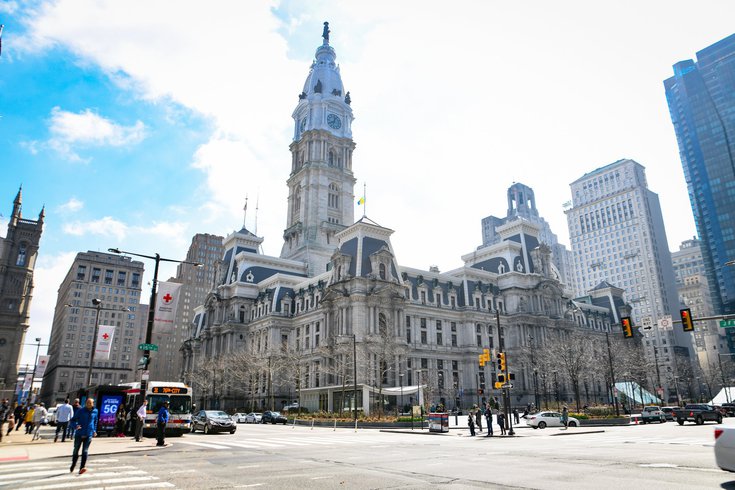
February 14, 2022
 Kate Frese/PhillyVoice
Kate Frese/PhillyVoice
Councilmember Kendra Brooks introduced a bill to reinstate emergency paid sick leave for Philadelphia workers impacted by COVID-19. The bill passed favorably out of committee on Monday, and is expected to be read at the next City Council meeting.
Philadelphia Councilmember Kendra Brooks has introduced a bill to reinstate emergency paid sick leave for workers impacted by the ongoing COVID-19 pandemic, which passed out of the Committee on Health and Public Safety on Monday.
The city still currently has a high level of community transmission of the virus, and Health Commissioner Dr. Cheryl Bettigole has said that the pandemic is not over due to people continuing to get sick and needing to be hospitalized. While cases are trending in the right direction, Philly is still averaging 1,896 positive COVID-19 cases every two weeks, as of Feb. 13.
This is why Councilmember Brooks has introduced an iteration of the bill for the third time since the pandemic began.
The first emergency paid sick leave law was in effect from Sept. 17 through Dec. 31, 2020, and provided up to 120 hours of paid sick leave to employees who tested positive for COVID-19 or needed to be out of work to care for a child whose school or daycare was impacted by the virus.
The second went into effect on March 29 and expired on June 10, and required businesses with 50 or more employees to provide up to 80 hours of paid sick leave to COVID-impacted workers.
In the third proposed bill, businesses with 10 or more employees would be required to provide up to two weeks of paid sick leave for employees who test positive for COVID-19, have to care for someone who has tested positive, or have to provide child care because of a COVID-related school or daycare closure.
The paid sick leave provided by the employer cannot come from accrued sick time that the employee already has, unless it is a business that is exempt from the law by providing generous sick leave to employees. Further, employees would not have to find coverage for their shift in order to use the sick leave provided to them.
The bill states that paid leave will be provided to an employee if their "presence on the job or in the community would jeopardize the health of others because of the employee's exposure to COVID-19 or because the employee is exhibiting symptoms that might jeopardize the health of others."
The extended bill also provides paid leave for vaccine appointments and additional recovery time for those seeking immunization.
Another new addition is an accountability measure, which would allow employees to report bad actor employers with violations of the law.
The Coalition for Restaurant Safety and Health, which works to prevent sexual harassment in Philly's restaurant industry, live-tweeted the public hearing on Monday. The proceeding included testimony from both workers and employers at several small businesses within the city.
"I didn't go to work for a week because I was sick with COVID-19, when I went back to work my boss told me that I didn't work there anymore and has already hired someone else."
— The Coalition for Restaurant Safety and Health (@CRSHphilly) February 14, 2022
Paid sick leave has been shown to influence the spread of COVID-19 by providing a way for workers to stay home without fearing for their employment status. Research by Nicholas Ziebarth, a labor and health professor at Cornell University, found that paid sick leave stopped 15,000 cases of COVID-19 in the first six months of the pandemic.
Philly first required businesses with 10 or more employees to provide paid sick leave in 2015, with the passing of the Promoting Healthy Families and Workplaces Ordinance. This law stated that a business would need to provide one hour of paid sick time for every 40 hours an employee worked.
Despite this, a survey conducted by the CRSH in January found that 50% of restaurant workers had no paid sick leave, and an equal amount worked while they were sick.
Restaurant workers have had a particularly difficult time adjusting to the constantly-changing pandemic landscape, which has often resulted in closures, lay-offs, and increased restrictions.
Tipped workers – who make a base pay of $2.53 per hour in Philly – have been some of the most negatively impacted. These workers have often had to go without the additional cash they make in tips when at home sick. But with access to sick pay, wages go up to Pennsylvania's minimum of $7.25.
Ziebarth told WHYY that a quarter of private sector workers in the United States, most notably low income and disadvantaged populations, often have no access to paid sick leave.
A report from the Economic Policy Institute found that Black workers were more likely to work in jobs that are classified as "essential," including low-wage jobs in grocery stores, convenience stores, child care, and warehouses.
Black workers are also less likely than white workers to have access to paid sick leave, or the ability to work remotely, two aspects of the pandemic-era workforce that have helped mitigate the spread of COVID-19.
The University of Penn's Wharton School of Business found in a 2021 study that essential workers were 55% more likely to contract COVID-19. The risk of household spread was also higher, with family members and roommates being 17% and 38% more likely to test positive, respectively.
More recently, 2.3% of American workers called out sick due to illness in January 2022, the highest level since the Bureau of Labor Statistics first began keeping track in 1976.
If passed, the law would expire on Dec. 21, 2023, which is widely extensive in order to protect workers from the unknown ebbs and flows of pandemic surges. The bill is expected to be voted on in a full City Council meeting in the coming weeks.